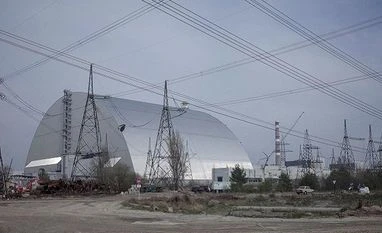The Chernobyl nuclear power plant, which was taken over by Russian forces last month, has stopped transmitting data to the IAEA, the UN atomic watchdog has said, expressing deep concern for the staff working under Russian troops at the nuclear site in northern Ukraine.
The Chernobyl site is not currently operational and handling of nuclear material has been halted. The facility holds decommissioned reactors as well as radioactive waste facilities, the International Atomic Energy Agency ( IAEA) said, citing information from Ukraine's nuclear regulator.
IAEA Director General Rafael Grossi "indicated that remote data transmission from safeguards monitoring systems installed at the Chornobyl NPP had been lost, the Vienna-based agency said in a statement on Tuesday.
The Agency is looking into the status of safeguards monitoring systems in other locations in Ukraine and will provide further information soon, it said.
The agency said it had been informed by Ukrainian officials that it is becoming increasingly urgent to rotate staff for the safe management of the Chernobyl nuclear power plant, where some 210 personnel have been working for almost two weeks straight since Russian forces seized control of the facility.
On February 24, Russian President Vladimir Putin ordered a special military operation against Ukraine.
In contrast to the current situation for staff at Ukraine's operating nuclear power plants who are rotating regularly, the same shift has been on duty at the Chernobyl NPP since the day before the Russian military entered the site of the 1986 accident on February 24, in effect living there for the past 13 days, the statement said, citing Ukraine's nuclear regulator.
The staff has been effectively living at the site of the world's worst nuclear disaster for the past 13 days and while they have access to food, water and medicine to a limited extent, their situation is worsening, the IAEA said.
I'm deeply concerned about the difficult and stressful situation facing staff at the Chernobyl nuclear power plant and the potential risks this entails for nuclear safety. I call on the forces in effective control of the site to urgently facilitate the safe rotation of personnel there, IAEA chief Grossi said in the statement.
Grossi has repeatedly stressed that staff operating nuclear facilities must be able to rest and work in regular shifts, asserting that this is crucial for overall nuclear safety.
Their capacity to make decisions free of undue pressure is among the seven indispensable pillars of nuclear safety and security he outlined at a meeting of the IAEA's Board of Governors on 2 March, convened to address the safety, security and safeguards implications of the situation in Ukraine, the IAEA said.
To help protect the country's nuclear facilities, the Director-General has expressed his readiness to travel to the Chernobyl NPP, or elsewhere, to secure the commitment to the safety and security of all Ukraine's nuclear facilities from the parties of the conflict, it said.
The site, located in an Exclusion Zone, includes decommissioned reactors as well as radioactive waste facilities. The regulatory authority said it could only communicate with the plant via e-mail, the IAEA said.
Regarding the status of Ukraine's operational nuclear power plants, the regulator said eight of the country's 15 reactors were operating, including two at the Zaporizhzhya NPP controlled since last week by Russian forces, and that the plants' personnel were working in shifts. Radiation levels at the sites were normal, the IAEA statement said.
Meanwhile, Russia on Wednesday said the situation at the Chernobyl nuclear power plant is controlled jointly by Russian troops, Ukrainian specialists and the National Guard.
Currently, control over the situation at the Chernobyl NPP is being exercised jointly by Russian servicemen, Ukrainian specialists, the plant's civilian personnel, and that country's National Guard, Russian Foreign Ministry Spokeswoman Maria Zakharova said.
Ukraine's allegations about 20-fold radiation increase at the Chernobyl plant are not true, Russia's state-run TASS news agency quoted her as saying.
The actions of the Russian military in this dangerous situation were motivated by the necessity to prevent a nuclear provocation from Ukrainian nationalists, who seem to have nothing to lose. As a matter of fact, they have been trained to do it. That is why Russian troops are taking Ukraine's nuclear facilities under control, she said, defending Russia's actions.
Unlock 30+ premium stories daily hand-picked by our editors, across devices on browser and app.
Pick your 5 favourite companies, get a daily email with all news updates on them.
Full access to our intuitive epaper - clip, save, share articles from any device; newspaper archives from 2006.
Preferential invites to Business Standard events.
Curated newsletters on markets, personal finance, policy & politics, start-ups, technology, and more.
)